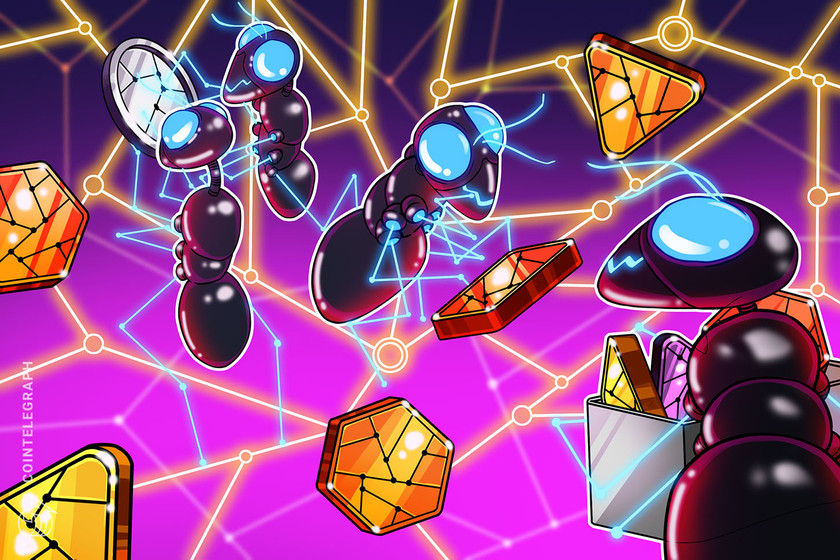
Polyient is launching an NFT marketplace with DeFi features, Ronaldinho has entered the NFT market and Vitalik Buterin has digitally signed an NFT for very little money.
Investment firm and development studio Polyient has unveiled an NFT marketplace with decentralized finance (DeFi) functionality.
The marketplace dubbed “PolyientX” is set for a beta release in August on Ethereum, with an official launch targeted for sometime in the Fall. The initial launch will feature NFTs from Ape In, a DeFi-enabled NFT collectibles game, and Rate Network, a decentralized NFT pricing, and rating protocol.
According to Polyient, users can stake their NFTs in a vault to earn rewards, describing it as “a unique fee share mechanism where users, not corporate stakeholders, are the beneficiaries of transaction activity on the platform.”
There’s also a new token launch method dubbed the “Initial Vault Sale” (IVS), which enables projects to leverage their supporters’ NFT assets “to mint and distribute utility and governance tokens, reward marketplace participation and build sustainable economies.”
Interested in migrating your NFT project to PolyientX? Apply for early accesshttps://t.co/OLE1nTmTDg
— PolyientX (@PolyientX) July 28, 2021
Blockchain-based Ronaldinho
Global soccer icon Ronaldinho is launching a new NFT collection in collaboration with creative studio INFLUXO.
The former Paris Saint-Germain, F.C Barcelona and AC Milan star joins a long list of star athletes to enter the NFT sector such as boxer Tyson Fury, NFL players Rob Gronkowski and Patrick Mahomes, and skateboarding icon Tony Hawk.
Are you ready for @influxo_NFT ? A pioneer of future digital collectibles https://t.co/9EYB3cCbG1 pic.twitter.com/onUDeqbxEn
— Ronaldinho Gaúcho (@10Ronaldinho) July 29, 2021
The NFTs are being sold in two different drops, the first drop features seven unique “masterpiece” NFTs that depict vivid paintings of key moments in Ronaldinho’s career.
The auctions will take minimum increment bids of $10,000, and the NFTs come with a private meetup and dinner with Ronaldinho in Dubai, a roundtrip ticket to get you there and a two-day stay at a five-star hotel. It is unclear if Ronaldinho will be cooking up a storm, or if the dinner will be at a restaurant.
The second drop of “sports legend card NFTs” includes a set of six collector cards which users can purchase for an unspecified price. They will be airdropped an additional card NFT that accompanies the series, and if they collect all six NFTs plus the airdropped token, they will be entered into a sweepstake for a chance to win the “Dubai experience” from the masterpiece NFTs.
The sale is being hosted on INFLUXO and the NFT drop date reads “coming soon.”
Animoca Brands acquires blowfish
Top NFT game and property developer Animoca Brands (F1 Delta Time, The Sandbox) has acquired Blowfish Studios, an indie game developer for around $6.6 million. The acquisition also includes payments of around $19.2 million on conditional employment and performance targets.
Animoca made the announcement on July 29, and noted that it will be working closely with Blowfish to “align efforts relating to blockchain integration, fungible tokens, non-fungible tokens (NFTs), play-to-earn capabilities, synergy opportunities, and product launches.”
Blowfish is a Sydney-based firm founded in 2010 by Benjamin Lee, a veteran of the computer software and 3D graphics industry, and Aaron Grove, an award-winning visual effects supervisor.
The firm has published several multi-platform games such as “Qbism, Siegecraft, Morphite, Projection: First Light, and Storm Boy.”
“Animoca Brands is incredibly thrilled to welcome Blowfish, a team that significantly expands our capacity in the cross-platform games space and that has a strong interest in and understanding of blockchain,” said Yat Siu, the co-founder and chairman of Animoca Brands.
Vitalik signs up for Mark Cuban-backed NFT platform
NFT platform “AlchemyNFT” announced a $6 million funding round on July 29. It was backed by Crypto.com Capital, Framework Ventures, Mechanism and billionaire entrepreneur (and DeFi rug-pull victim) Mark Cuban.
The funds will go towards a new project dubbed “AutographNFT” that enables the signing of unique digital assets such as NFTs with social network IDs. According to the firm Ethereum’s Vitalik Buterin was one of the first to digitally sign his autograph at the project's beta launch.

The AutographNFT platform enables NFT creators to seek out popular “Twitter-verified” figures and offer them money to autograph an NFT. The platform gives the signer the option to donate all or some of their “signing” proceeds to a charity such as “Save the Kids.”
According to the listing of “The Alchemist” NFT, Buterin was paid 0.1 ETH, worth around $243, to sign the NFT.
Related: NFT-based game Splinterlands raises $3.6M via private token sale
Publicist claims NFT sale of $4800 is a 'staggering' sum
Public relations media releases are often full of hyperbolic jargon and puffery that paints an all too pretty picture.
But we had to laugh at a July 28 PR announcement from Kinahan’s Whiskey Co. in which the sale of an NFT for $4800 was described as a “staggering” amount of money.
“The Kinahan’s branded 3D Formula Racing Car sold to an NFT collector for a staggering $4800 following Lewis Hamilton’s thrilling win at the British Grand Prix,” the announcement breathlessly said.
While this may be exciting news for the Irish Whiskey firm, they may not realize that NFTs of questionable value have sold for much higher prices. Cointelegraph reported in February that Lindsay Lohan sold an NFT for an even more earth-shattering $15,000 on Rarible. And there were rumors some guy called Beeple or Bongo or something flogged an NFT for $69 million.
“This NFT is the first of its kind in the whiskey industry. Notice that precious word, ‘first’. There are many models of a McLaren, but if you own the first one, you own a piece of history,” the announcement read.
Roundup
Cointelegraph reported on July 28 that multinational beverage giant Coca-Cola is entering the NFT market.
The firm will hold a three-day auction on OpenSea for NFTs depicting the famous beverage, and the proceeds will be used to raise money for Special Olympics International.
Earlier this week, tokenized cats once again caused chaos on the Ethereum network after a nonfungible token (NFT) project dubbed “Stoner Cats” created by actress Mila Kunis sold out in 35 minutes.
The project’s first drop had a total of 10,420 NFTs, and activity on Ethereum sent gas prices as high as 709 Gwei ($33.67) for a rapid transaction.







